Live Chat Etiquette Tips for Offering Superior Customer Service
Businesses that follow live chat etiquette can witness happy and satisfied customers, which means an increase in sales conversation and a higher retention rate.
One of the most important goals of every business is to deliver exceptional customer service.
Companies that earn $1 billion annually can expect to earn, on average, an additional $700 million within 3 years of investing in customer experience. It is no secret how customers would happily recommend a brand to their family or friends after having a successful experience.
Live chat has become a preferred method of communication for businesses and customers alike.
But how do you ensure that your support agents are handling customer conversations effectively? For that support representatives need to follow live chat etiquette to deliver top-notch services. With the help of a live chat’s comprehensive guide, we can increase the customer satisfaction index.
Let us explore the key elements of service chat etiquette and provide the knowledge to effectively communicate with your customers.
Live chat etiquette refers to the set of guidelines that should be followed when engaging in customer conversations via live chat support. It creates a solid base for efficient communication, enabling businesses to meet their customers’ needs.
Key objectives of live chat etiquette are:
Live chat allows businesses to interact with their customers in real time, providing instant support and assistance. There are some live chat etiquette that should be followed to ensure a positive experience for both the customer and the business.
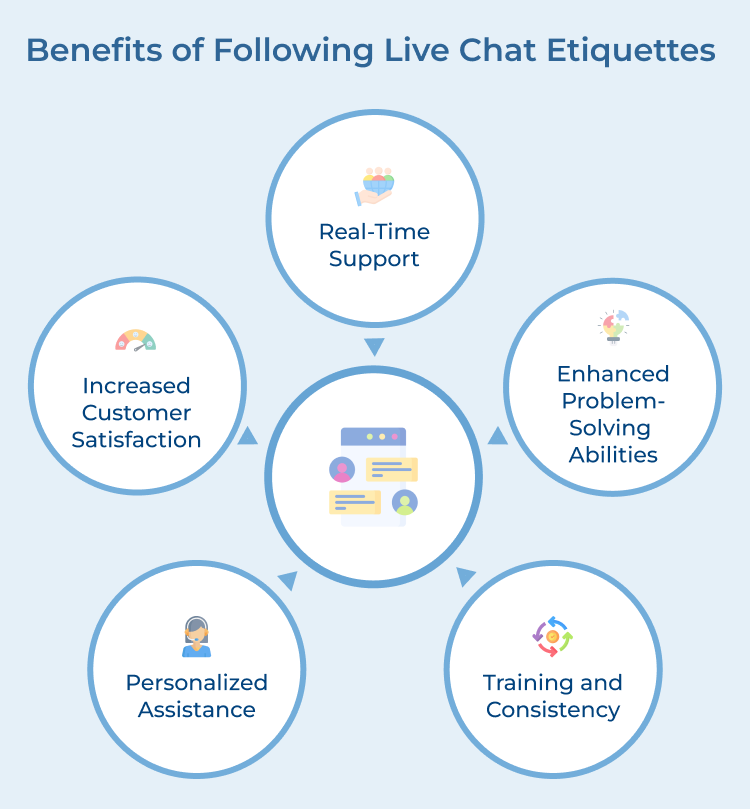
Let us discuss the key benefits of following live chat etiquettes:
Conversations that are fueled by live chat etiquette allow agents to understand customer needs better and provide personalized assistance with tailored solutions. It helps businesses to build strong customer relationships.
The customer support staff trained with the right chat etiquette that showcases empathy and understanding. They also have amazing problem-solving capabilities. It helps to address customer concerns effectively and increases the satisfaction ratio.
Live chat allows businesses to offer real-time support to customers. By following service chat etiquette and responding promptly, businesses can address customer concerns immediately, delivering a delightful experience.
Following chat etiquette encourages agents to actively listen and understand customers’ needs. It helps them develop better problem-solving skills, enabling them to identify and address the root cause of the issues effectively.
When your staff follows live chat etiquette consistently, it becomes easier to train new employees and maintain a high level of service quality. It ensures that every customer receives the same level of professionalism and attention.
Poor customer service hurts customer satisfaction and impacts your brand credibility. By making your team understand what is chat etiquette and providing the chat guidelines, you can deliver an excellent live chat support experience.
Let us discuss the popular chat etiquette rules that can be followed by the business to set live chat etiquette examples.
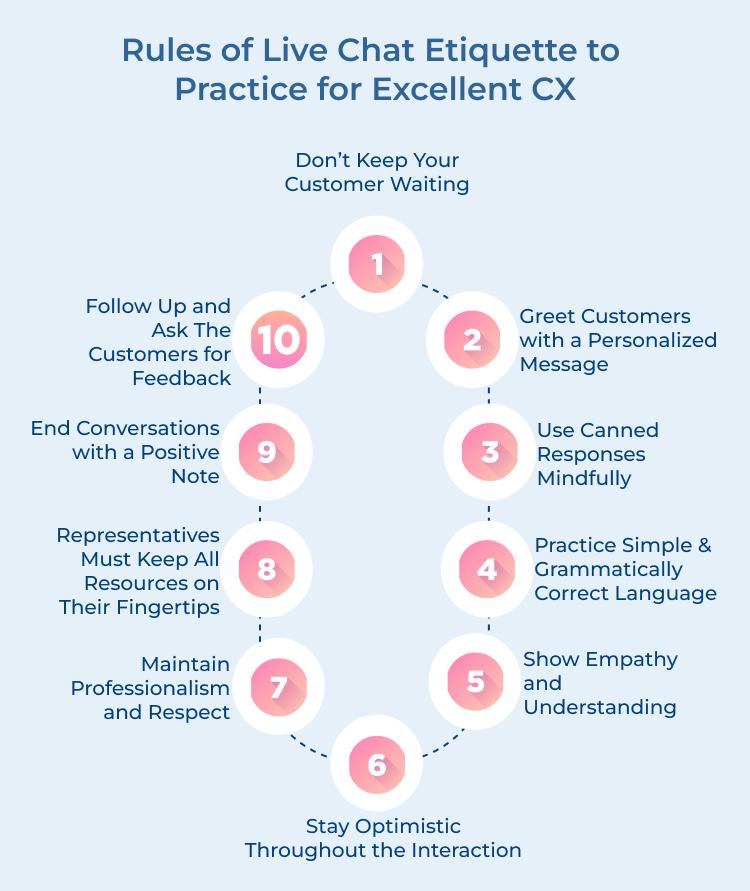
Here are some essential rules of live chat etiquette to implement for better customer experience (CX).
Getting a prompt response is a top customer service expectation of modern customers.
Customers should not be left waiting for a long time. Assign your staff to handle live chat interactions and ensure they are available to respond to the queries.
Implement live chat etiquette by setting clear guidelines for your customer support team. It includes defining response time goals and establishing a process for handling multiple chats simultaneously. Training your team to be attentive, polite and knowledgeable is crucial.
Here are some pro tips:
Stomer with a personalized message can do wonders and can greatly enhance the customer experience. It sets the tone for the conversation, making the customer feel welcomed and likely to trust the assistance they receive.
It showcases a customer-centric approach, showing that your company values their individual needs. The simple gesture creates a positive first impression and also helps establish a connection with the customer.
Here are some pro tips:
Canned responses are pre-written messages that can be used to quickly respond to common queries. Using canned responses mindfully is essential for ensuring a positive customer experience.
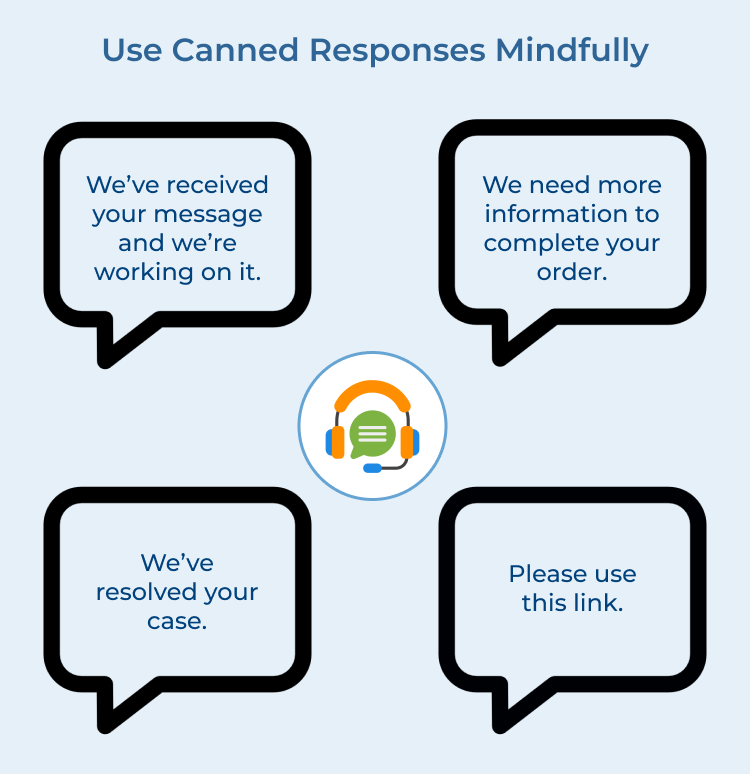
Some examples of canned responses are:
When used correctly, they can help streamline customer support processes, reduce response times and maintain consistency across interactions.
Here are some pro tips:
Simple language with correct grammar and spelling enhances the overall customer experience. It creates a sense of reliability, building trust between the customer and the business.
Use simple and grammatically correct language. It enhances clarity and minimizes the chance of miscommunication. Always proofread your messages before sending them to ensure accuracy.
Here are some pro tips:
Being understanding builds trust and rapport with customers. It leaves them satisfied with the overall experience.
Avoid interrupting or rushing through the conversation. Take the time to fully understand the issue before offering a solution.
Empathy enables you to identify underlying issues and address them appropriately, leading to a more efficient problem-solving process. Responding with empathetic statements like, “I understand how frustrating this must be for you,” or “I apologize for the inconvenience caused” can make a significant impact.
Here are some pro tips:
Staying optimistic is the essence because it sets a positive tone and can help diffuse any potential issues that the customer may be experiencing. It is crucial to respond to customer queries and concerns with a can-do attitude, focusing on finding solutions rather than dwelling on the problem.
Positive interactions contribute to the overall perception of a brand. A pleasant live chat experience can impress customers and differentiate a business from its competitors. Customers are more likely to remember and recommend companies that exhibit a positive attitude.
Here are some pro tips:
Maintaining professionalism while using live chat is crucial because it helps to build trust and credibility.
You create a positive emotional connection by treating customers with respect, that can inspire loyalty and repeat business. Be polite, attentive, and empathetic. Avoid using slang, jargon or emoticons that may confuse or offend the customer.
Here are some pro tips:
Representatives must ensure that they have quick easy access to all the necessary information and tools.
It includes product knowledge, FAQs, troubleshooting guides and any other relevant resources. By having these resources readily available, representatives can provide accurate and timely responses to customer queries.
Here are some pro tips:
The importance of concluding conversations with a positive note lies in the lasting impression it leaves on customers. It enhances their overall experience and increases the likelihood of them returning for future interactions or making repeat purchases.
Ensure that all your responses are courteous and professional. Use phrases like “thank you,” “you’re welcome,” and “have a great day” to end conversations on a positive note. If appropriate, extend your support by offering further assistance.
Assure the customer that you are available to help them in the future and provide information on how they can reach out to you again if needed.
Here are some pro tips:
After a live chat conversation with a customer has ended, send them a follow-up message. Thank them for their time and reiterate any important information discussed. It shows that you value their engagement and are committed to providing excellent customer service.
Asking for feedback is equally important. It allows you to gauge customer satisfaction and identify areas for improvement. Include a short survey or feedback form in your follow-up message, asking customers to rate their experience and provide any comments or suggestions.
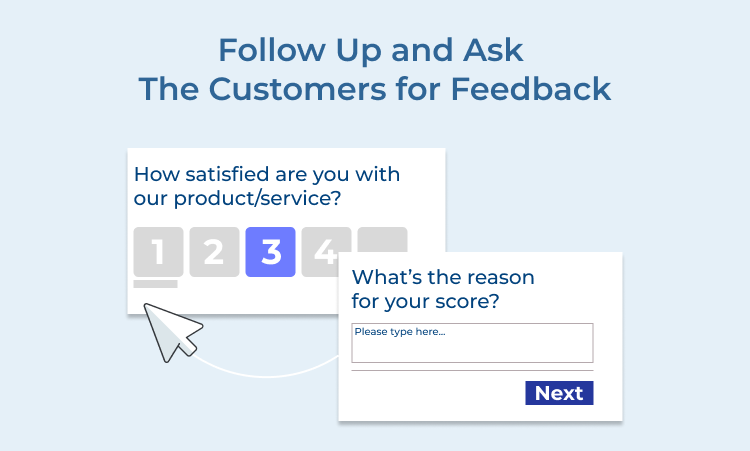
Here are some pro tips:
Live chat allows customers to engage in real-time conversations with a business representative, making it a popular choice for many companies looking to provide quick and efficient customer service.
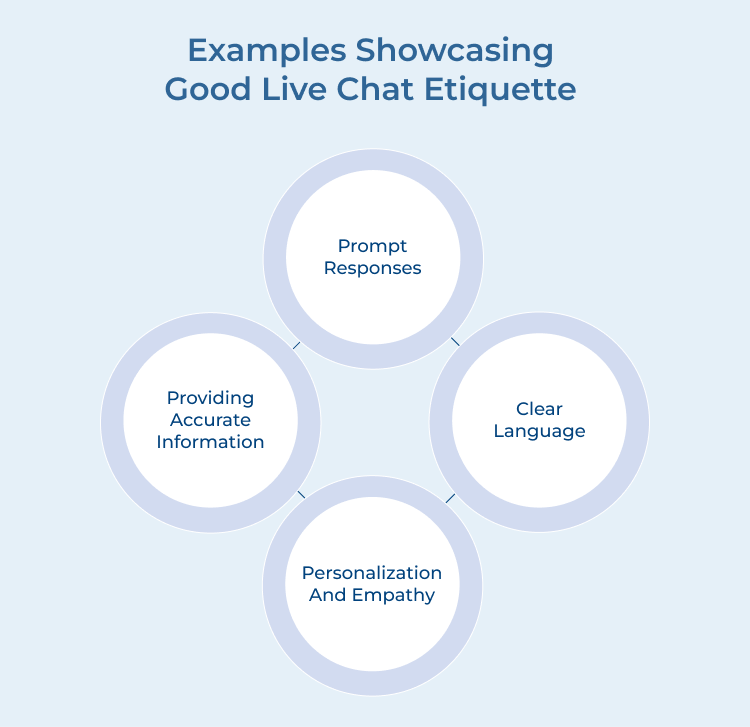
Let’s take a look at some real-time examples showcasing good live chat etiquette.
One of the most important aspects of live chat etiquette is responding promptly to customer inquiries. Delayed responses can lead to frustration and a negative impression of your company. Take a look at the example:
Customer: “Hello, I have a question about the delivery status of my order. Can you please help?”
Good Response: “Hello! Thank you for reaching out. I’ll be happy to assist you with your inquiry. Could you please provide me with your order number?”
The support representative acknowledges the customer’s question and assures that they will assist. They also request the necessary information to address the issue promptly.
While engaging in live chat conversations, it’s important to use concise language to avoid misunderstandings. Here’s an example showcasing good language usage:
Customer: “I purchased a product online, but it’s not working properly. What should I do?”
Good Response: “I apologize for the inconvenience. To assist you further, could you please provide me with the specific issue you are facing?”
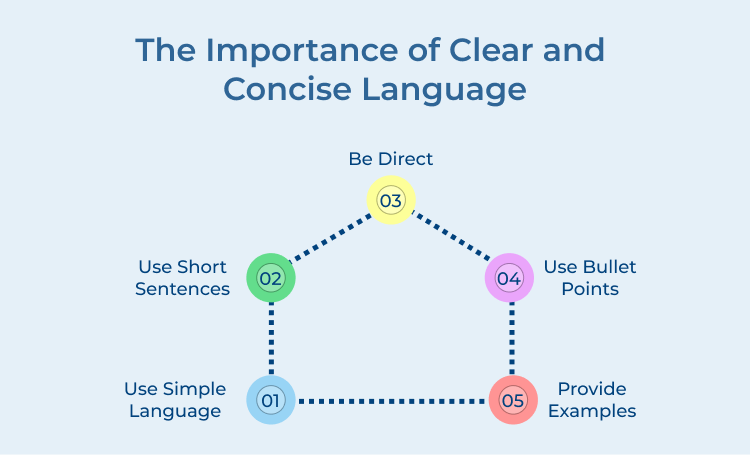
The representative acknowledges the customer’s concern, apologizes for the inconvenience, and asks for more details to provide appropriate assistance. The clear and concise response ensures that both parties are on the same page.
Customers appreciate when representatives make an effort to personalize their responses and show empathy toward their concerns. The example demonstrates these qualities:
Customer: “I’m extremely frustrated with your company’s shipping delays. This is the second time it has happened!”
Good Response: “I’m truly sorry for the inconvenience you’ve experienced. I understand how frustrating it can be. Let me look into this matter and find a solution for you.”
The support reps show understanding and make the customer feel valued by using empathetic language also acknowledging the customer’s frustration. It can help build trust and loyalty.
One of the worst things you can do in live chat support is to provide inaccurate or misleading information. Always ensure that the information you provide is accurate and reliable. Take a look at the example:
Customer: “I read online that your product has a warranty of two years. Is that correct?”
Good Response: “Yes, that is correct. Our products do come with a warranty period of two years from the date of purchase.”
The representative ensures that the customer’s expectations are met by providing the correct information and prevents any potential disappointment or confusion.
As a business owner or customer service representative, it’s important to implement certain rules of etiquette to ensure a positive experience for your customers. Practicing live chat etiquette is vital for providing superior customer service. It provides instant assistance to customers and allows for quick problem resolution.
Personalized greetings, concise responses, and grateful closings are key elements to provide a positive and effective live chat experience. Remember, live chat is a powerful tool for customer support and by utilizing proper etiquette, you can make the most of the channel.
1. How can I improve my live chat etiquette?
Improving your live chat etiquette involves several key factors. Ensure that you are using proper grammar and spelling to convey your message. Be prompt and respond to customer inquiries on time. Show empathy and provide personalized assistance to make customers feel valued.
2. What are the most common mistakes people make when using live chat?
The most common mistakes in live chat include using automated or generic responses, being unresponsive or slow to answer and not actively listening to customer’s concerns. Typing errors or failing to address the customer by name may be seen as unprofessional.
3. How can I ensure I’m being polite and professional in live chat?
Being polite in live chat means using appropriate greetings and salutations, addressing customers by name and avoiding using slang or informal language. Show empathy towards customers’ issues and use positive language when providing solutions.
4. What should I avoid doing when using live chat?
Avoid multitasking or appearing distracted while interacting with customers in live chat. Do not use jargon or technical terms that customers may not understand. Refrain from using excessive capitalization or exclamation marks as they might come across as aggressive or rude.
5. How can I make sure I’m providing accurate information in live chat?
Providing accurate information is crucial in live chat. If you are unsure of an answer, it’s better to admit your lack of knowledge than to provide incorrect information. Offer to find the answer or direct the customer to someone who can help. It’s essential to maintain your credibility and not risk damaging the customer’s trust.
6. What should I do if I don’t know the answer to a question in live chat?
If you encounter a question you’re unsure about, be honest and transparent with the customer. Apologize for not having the answer and assure them that you will find it. Then, make sure to escalate the question to a more knowledgeable team member or supervisor. Keeping the customer informed and involved in the process shows a commitment to providing excellent service.
7. How can I make sure I’m responding quickly enough in live chat?
Responding promptly is crucial in live chat. Set realistic response time expectations and aim to reply within a reasonable timeframe, typically within a few minutes. If you anticipate delays, use an automated message to inform the customer and provide an estimated wait time. Regularly check for new messages and prioritize urgent inquiries. Efficient and timely responses demonstrate your dedication to customer satisfaction.